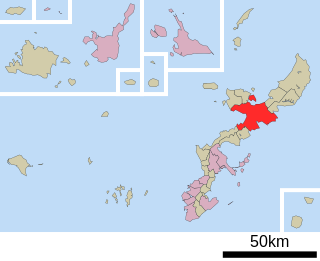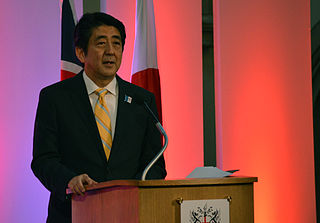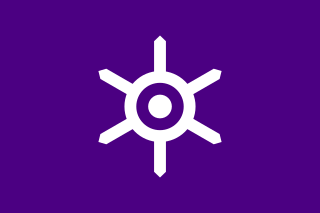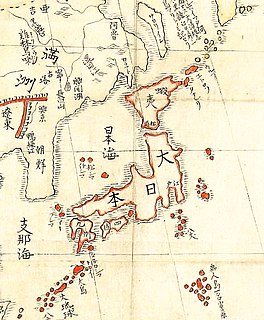 W
WThe politics of Japan are conducted in a framework of a multi-party bicameral parliamentary representative democratic constitutional monarchy in which the Emperor is the Head of State and the Prime Minister is the Head of Government and the Head of the Cabinet, which directs the executive branch.
 W
WThe 1945 Katsuyama killing incident was the murder of three African-American United States Marines in Katsuyama near Nago, Okinawa after the Battle of Okinawa in June 1945. Residents of Katsuyama had reportedly killed the three Marines for their repeated rape of village women during occupation of Okinawa and hid their bodies in a nearby cave out of fear for retaliation. The Katsuyama incident was kept secret until 1997 when the bodies and identities of the Marines were discovered.
 W
WThe 1955 system (55年体制) refers to the political system in Japan since 1955 in which the Liberal Democratic Party (LDP) has successively held a majority government with opposition parties incapable of forming a significant alternative. The terms 1955 system or the one-and-a-half system are credited to Junnosuke Masumi who described the system of 1955 as "a grand political dam into which the history of Japanese politics surge."
 W
WAfter 30 years on the Chrysanthemum Throne, the then 85 year-old Emperor Akihito of Japan abdicated on 30 April 2019, being the first Emperor of Japan to do so since 1817. This marked the end of the Heisei era and the inception of the Reiwa era, and saw numerous festivities leading up to the accession of his son and successor, Emperor Naruhito. The Enthronement Ceremony took place on 22 October 2019. Akihito's younger son, Prince Akishino, is his brother's heir presumptive.
 W
WAbenomics refers to the economic policies implemented by the Government of Japan led by the Liberal Democratic Party (LDP) since the December 2012 general election. They are named after Shinzō Abe, who served a second stint as Prime Minister of Japan from 2012 to 2020. After Abe resigned in September 2020, his successor, Yoshihide Suga, has stated that his premiership will focus on continuing the policies and goals of the Abe administration, including the Abenomics suite of economic policies.
 W
WAinu Revolution Theory is a left-wing political idea in Japan that was active in the 1970s. It was a variant of Proletarian Revolution Theory that came to light shortly after the revision of the Treaty of Mutual Cooperation and Security Between the United States and Japan, focusing on the Ainu. The actions and writings of Japanese left-wing thinker Ota Ryu in particular made Ainu Revolution Theory well known.
 W
WLong one of the world's most committed promoters of civilian nuclear power, Japan's nuclear industry was not hit as hard by the effects of the 1979 Three Mile Island accident (USA) or the 1986 Chernobyl disaster (USSR) as some other countries. Construction of new plants continued to be strong through the 1980s and into the 1990s. However, starting in the mid-1990s there were several nuclear related accidents and cover-ups in Japan that eroded public perception of the industry, resulting in protests and resistance to new plants. These accidents included the Tokaimura nuclear accident, the Mihama steam explosion, cover-ups after accidents at the Monju reactor, and the 21 month shut down of the Kashiwazaki-Kariwa Nuclear Power Plant following an earthquake in 2007. Because of these events, Japan's nuclear industry has been scrutinized by the general public of the country.
 W
WThe Aso Mining forced labour controversy concerns the use of Allied prisoners of war (POW) and Korean conscripts as labourers for the Aso Mining Company in Japan during World War II. Surviving labourers and other records confirmed that the prisoners and conscripts were forced to work in harsh, brutal conditions for little-to-no pay and that some died, at least in part, because of the ill-treatment at the mine.
 W
WThe Chukyo Metropolis proposals are proposed transformations of the Aichi prefecture into a metropolis. Aichi's prefectural governor, Hideaki Omura, formed the Chukyo Isshin no Kai or Chukyo Metropolitan Area Renewal Association in 2012. The latter plan is an alternate that also incorporates Gifu prefecture in the Metropolis.
 W
WThere have been several controversies regarding the role and the status of the Emperor of Japan. This is due in part to the variety of roles the Emperor has historically filled, as well as the competition for power with other parts of Japanese society at several points in history.
 W
WThe Cool Biz campaign is a Japanese campaign initiated by the Japanese Ministry of the Environment from summer 2005 as a means to help reduce Japanese electricity consumption by limiting the use of air conditioning. This was enabled by changing the standard office air conditioner temperature to 28 °C and introducing a liberal summer dress code in the bureaucracy of the Japanese government so staff could work in the warmer temperature. The campaign then spread to the private sector.
 W
WFamily policy in the country of Japan refers to government measures that attempt to increase the national birthrate in order to address Japan's declining population. It is speculated that leading causes of Japan's declining birthrate include the institutional and social challenges Japanese women face when expected to care for children while simultaneously working the long hours expected of Japanese workers. Japanese family policy measures therefore seek to make childcare easier for new parents.
 W
WThe Governor of Tokyo is the head of government of Tokyo.
 W
WThe first human inhabitants of the Japanese archipelago have been traced to prehistoric times around 30,000 BCE. The Jōmon period, named after its cord-marked pottery, was followed by the Yayoi people in the first millennium BCE when new inventions were introduced from Asia. During this period, the first known written reference to Japan was recorded in the Chinese Book of Han in the first century CE.
 W
WThe history of Japanese foreign relations deals with the international relations in terms of diplomacy, economics and political affairs from about 1850 to 2000. The kingdom was virtually isolated before the 1850s, with limited contacts through Dutch traders. The Meiji Restoration was a political revolution that installed a new leadership that was eager to borrow Western technology and organization. The government in Tokyo carefully monitored and controlled outside interactions. Japanese delegations to Europe brought back European standards which were widely imposed across the government and the economy. Trade flourished, as Japan rapidly industrialized.
 W
WThe Japan Innovation Party was a political party in Japan. It was launched on 22 September 2014, following the merger of the Japan Restoration Party headed by Tōru Hashimoto, and the Unity Party, led by Kenji Eda. On 27 March 2016 the party merged with the Democratic Party of Japan and Vision of Reform to form the Democratic Party (Minshintō).
 W
WThe Liberal Democratic Party , frequently abbreviated to LDP or Jimintō (自民党), is a conservative political party in Japan.
 W
WThe Minister of Defense , or Bōei-shō (防衛相), is a member of the Japanese cabinet and is the leader and chief executive officer of the Japanese Ministry of Defense, the executive department of the Japanese Armed Forces. The minister of defense’s position of command and authority over the military is second only to that of the Prime Minister of Japan, who is the commander-in-chief. The minister of defense is appointed by the Prime Minister and is a member of the National Security Council. The current Minister of Defense is Nobuo Kishi, who took office on September 16, 2020.
 W
WThe Party for Japanese Kokoro , officially the Party to Cherish the Heart of Japan , was a Japanese political party. It was formed as the Party for Future Generations on 1 August 2014 by a group of Diet members led by Shintarō Ishihara. The party adopted its final name in December 2015, and ended up dissolving in November 2018.
 W
WThe President of the House of Councillors is the presiding officer of the House of Councillors of Japan, and together with the Speaker of the House of Representitives, the President is also the head of the legislative branch of Japan. The President is elected by members of the House at the start of each session, and can serve two three year terms, for a maximum of six years.
 W
WThe prime minister of Japan is the head of government of Japan, the chief executive of the National Cabinet and the commander-in-chief of the Japanese Armed Forces; he is appointed by the emperor of Japan after being designated by the National Diet and must enjoy the confidence of the House of Representatives to remain in office. He is the head of the Cabinet and appoints and dismisses the other ministers of state. The literal translation of the Japanese name for the office is Minister for the Comprehensive Administration of the Cabinet.
 W
WSmoking in Japan, though historically less restricted by law than in many other nations, has significantly changed in recent years. Tobacco use has been in nearly constant decline since 1996 and the decline has been mainly accelerating in recent years.
 W
WIn Japan, sound trucks, vehicles equipped with a public address system, are used by political parties and candidates to express their views. Vendors also use sound trucks for the purpose of selling goods, collecting recyclable materials, and other purposes. The trucks have one or more loudspeakers which play a recorded message or recorded music as the truck tours through neighborhoods.
 W
WThe Speaker of the House of Representatives is the presiding officer of the House of Representatives of Japan, and together with the President of the House of Councillors, the Speaker is also the head of the legislative branch of Japan. The Speaker is elected by members of the House at the start of each session, and can serve for a maximum of four years.
 W
WThe President of the House of Councillors is the presiding officer of the House of Councillors of Japan, and together with the Speaker of the House of Representitives, the President is also the head of the legislative branch of Japan. The President is elected by members of the House at the start of each session, and can serve two three year terms, for a maximum of six years.
 W
WUnited States nuclear weapons were stored secretly at bases throughout Japan following World War II. Secret agreements between the two governments allowed nuclear weapons to remain in Japan until 1972, to move through Japanese territory, and for the return of the weapons in time of emergency.
 W
WUniversal basic income refers to a social welfare system where all citizens or residents of a country receive an unconditional lump sum income, meaning an income that is not based on need. The proposal has been debated in a number of countries in recent years, including Japan..
 W
WThe Yumiko-chan incident was the rape and murder of six-year-old Japanese girl Yumiko Nagayama by American soldier Sergeant Isaac J. Hurt in Kadena, Okinawa on 3 September 1955. Nagayama's body was found near Kadena Air Base during the U.S. occupation of Okinawa, and an investigation led to the conviction of 31-year-old Sergeant Hurt on charges of murder, rape, and kidnapping. The Yumiko-chan Incident caused anti-American outrage in Okinawa and contributed to the first major Okinawan protests against the U.S. occupation and military presence.
 W
WThe All-Campus Joint Struggle Committees, commonly known as the Zenkyōtō, were Japanese student organizations consisting of anti-government, anti-Japanese Communist Party leftist and non-sectarian radicals. The Zenkyōtō were formed to organize students during the 1968–69 Japanese university protests. Unlike other student movement organizations, graduate students and young teachers were allowed to participate. Active in the late 1960s, Zenkyōtō was the driving force behind clashes between Japanese students and the police. Zenkyōtō groups were driven by alienation and a reaction to "American imperialism", Japanese "Monopoly Capitalism", and "Russian Stalinism". However, many members of the movement were non-political, and were focused more on more practical and local problems. Much of the movement centered around nihilism, humanism and existentialism, which served as inspirations for revolution.